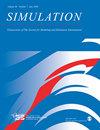Examining the impacts of military expenditures on economic productivity: a system dynamics approach
IF 2
4区 工程技术
Q4 COMPUTER SCIENCE, INTERDISCIPLINARY APPLICATIONS
Simulation-Transactions of the Society for Modeling and Simulation International
Pub Date : 2023-08-19
DOI:10.1177/00375497231192108
引用次数: 0
Abstract
The relationship between military expenditures and economic productivity has taken the attention of many researchers and there exist an important number of studies approaching the topic through several techniques. However, there is no consensus among the scholars whether military expenditures trigger economic growth, productivity, and other macroeconomic indicators. Such arguments are mainly due to unclear results obtained from the existing studies, in which the complex relationships between military expenditures and macroeconomics are not fully incorporated. Considering the bidirectional and nonlinear relationships among macroeconomic indicators and complex feedback mechanisms, a system dynamics (SD) model for examining the impacts of military expenditures on economic productivity in Turkey is proposed. The proposed SD model aims to reflect the complex environment surrounding the military spending–economic productivity nexus and to analyze the feedback structures that lead to miscellaneous consequences with delays. A stock–flow model is developed to represent the complex nonlinear relationships and causalities between the variables. Data from SIPRI, the World Bank, and several local statistical sources covering the years 2009–2018 are utilized to simulate the existing case, warfare in neighbors, economic shrinkage scenarios, and the combination of the latter two. The results obtained from the scenarios suggest that short fixes such as importing military products instead of national investments give rise to chronic issues like continual dependence on foreign supply, hence, leading to decrease in overall economic growth. To the best of our knowledge, this is the first attempt to integrate SD methodology with military expenditure and economic productivity analysis.考察军事开支对经济生产力的影响:系统动力学方法
军费开支与经济生产力之间的关系已经引起了许多研究者的注意,并且已经有许多研究通过几种技术来探讨这一主题。然而,对于军事开支是否会引发经济增长、生产率和其他宏观经济指标,学者们并没有达成共识。这种论点主要是由于从现有的研究中得到的结果不明确,其中没有充分考虑到军事开支与宏观经济之间的复杂关系。考虑到宏观经济指标之间的双向和非线性关系以及复杂的反馈机制,提出了一个用于研究土耳其军费开支对经济生产力影响的系统动力学模型。所提出的可持续发展模型旨在反映围绕军费开支与经济生产力关系的复杂环境,并分析导致各种延迟后果的反馈结构。建立了一个股票流动模型来表示变量之间复杂的非线性关系和因果关系。来自斯德哥尔摩国际和平研究所、世界银行和几个地方统计来源的数据涵盖了2009-2018年,用于模拟现有情况、邻国战争、经济萎缩情景以及后两者的结合。从这些情景中得到的结果表明,短期解决办法,如进口军事产品而不是国家投资,会导致长期问题,如持续依赖外国供应,从而导致整体经济增长下降。据我们所知,这是第一次尝试将可持续发展方法与军事开支和经济生产力分析结合起来。
本文章由计算机程序翻译,如有差异,请以英文原文为准。
求助全文
约1分钟内获得全文
求助全文
来源期刊
CiteScore
3.50
自引率
31.20%
发文量
60
审稿时长
3 months
期刊介绍:
SIMULATION is a peer-reviewed journal, which covers subjects including the modelling and simulation of: computer networking and communications, high performance computers, real-time systems, mobile and intelligent agents, simulation software, and language design, system engineering and design, aerospace, traffic systems, microelectronics, robotics, mechatronics, and air traffic and chemistry, physics, biology, medicine, biomedicine, sociology, and cognition.

 求助内容:
求助内容: 应助结果提醒方式:
应助结果提醒方式:


